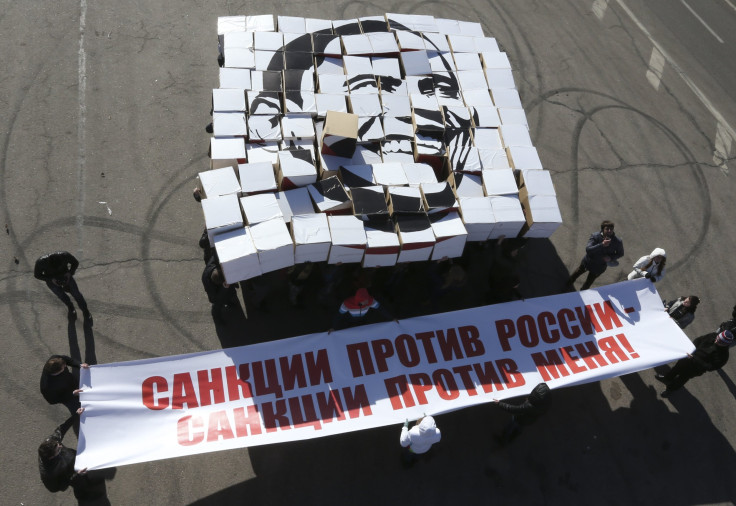Russian Companies Shrug Off US Sanctions – For Now

MOSCOW -- Soon after U.S. sanctions targeting members of President Vladimir Putin’s inner circle were announced last month, Olga Promptova, a Russian business owner, received a message from a German client who was worried about the delivery of her Russian-made clothing.
But Promptova, who runs DD Atelier, a company that makes lingerie and dresses for full-figured women and sells its products in Russia, Europe and the United States, is telling her customers they should not be concerned.
"For now we haven't felt anything,” said Promptova, who added that she was “more concerned about the rise of euro, since we pay for materials in foreign currency."
But even if harsher sanctions, in the wake of Russia’s annexation of Crimea and intervention in Ukraine, depressed the Russian ruble even further against the dollar and euro, it would not be a disaster for her company. A cheaper ruble could in fact make her Russian-made products "more competitive," Promptova said, on international markets.
As for the political tensions with Ukraine, they aren’t affecting her business, either: "It’s a poor region, and we have a very limited number of clients there," she said.
Promptova isn’t alone. Despite earlier fears, the sanctions imposed by the U.S. Treasury Department in mid-March, after Russia annexed Ukraine’s autonomous Crimea Peninsula, were not viewed as hard-hitting by many Russian businesses.
"We mostly work on the internal market, and while we do have contacts with international organizations, there have been no changes in our relationship [with them]," said a spokesperson for Russian Grids, the largest electricity transmission company in the country.
The U.S. is unlikely to push for further sanctions that would truly cripple the Russian economy, Matthew Rojansky, director of the Kennan Institute in Washington, D.C., and an expert on relations between the U.S. and ex-Soviet states, said.
Despite the statement on March 20 by President Barack Obama that any new sanctions would affect "key sectors” of the Russian economy, the White House said it would perform cautious "calculations" before imposing them, Rojansky said.
"I don't think that Obama is thinking: ‘I need to do something and it doesn’t matter what I do, because I don’t have another election,’” he said.
In that same March 20 statement, in fact, Obama added that sanctions that hit the Russian economy hard are “not our preferred outcome” because they would “not only have a significant impact on the Russian economy but could also be disruptive to the global economy.”
So far, the U.S. has targeted senior political heavyweights surrounding President Vladimir Putin. Those include Kremlin chief of staff Sergei Ivanov; the head of Russian Railways, Vladimir Yakunin; former Minister of Education Andrei Fursenko; and billionaire Gennady Timchenko, who said that because of sanctions, he faced difficulties paying for his wife’s surgery abroad.
The only company included in the list of subjects targeted by U.S. sanctions is Rossiya Bank, whose chairman of the board is Yuri Kovalchuk, who is also believed to have close ties to Putin.
Personal sanctions were not imposed against some members of Putin's circle, such as Igor Sechin, chairman of the board of state-owned OAO Rosneft (MCX:ROSN), Russia’s biggest oil company. Rosneft is a partner of the U.S.-based Exxon Mobil Corporation (NYSE:XOM), the second-biggest oil company in the world by revenue. Last December, the two companies signed a deal to develop oil reserves in Siberia.
Dmitry Mosienko, editor in chief of Kiev, Ukraine-based Oil Market magazine, said that Sechin was not included in the sanctions list precisely because of his company’s involvement with an American business partner -- especially in the joint development of Arctic oil fields, which have “great potential."
"It would be stupid to bite Igor Ivanovich now," he said, referring to Sechin by his name and patronymic.
Sergey Chemezov, CEO of state-owned industrial conglomerate Rostec and another close Putin associate, also escaped personal sanctions. Among other industries, Rostec includes VSMPO-AVISMA (MCX:VSMO), the world’s biggest titanium producer, which supplies the metal used to build aircraft for the Boeing Co. (NYSE:BA).
Rostec spokeswoman Yekaterina Baranova said in an email that VSMPO-AVISMA "is still working according to the planned schedule, which also covers cooperation with Boeing." Both sides renewed their agreement for 10 more years last November.
There's been no change in the cooperative nature of the two companies in space, either. The U.S. government has not stopped buying Russian engines for its Atlas-V and Antares rockets, and even though the Defense Department is reviewing whether buying such sensitive equipment from Russia has national security implications, producing alternative engines domestically may be too expensive.
General Mark A. Welsh, chief of staff of the U.S. Air Force, said in March that making an equivalent of the Russian RD-180 rocket engine would take five years and cost approximately $1 billion.
In the Russian aerospace industry, the bigger concern is that in case of further sanctions, the U.S might ban the export of electronic components used by Russian companies that work for both the defense and space sectors, a senior space industry official said.
The official, who spoke on condition of anonymity, said that industry players have already begun to look for possible solutions in case that happens. “Sanctions might push us to start building our own component base, with unexpected partners," he said, referring to France as one such possible partner.
But dealing with France might not be possible in the event that the European Union, which includes Russia's leading trade partners, also opts for tougher sanctions. And that outcome -- in which European companies (including aerospace and defense players) would stop doing business with Russia because their governments told them to -- is what Russia’s First Deputy Prime Minister Igor Shuvalov called last month “the worst-case scenario.”
© Copyright IBTimes 2024. All rights reserved.





















